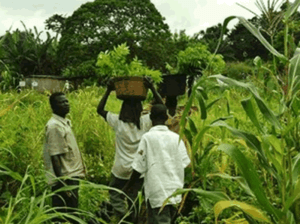Stakeholders deliberate on policy for agriculture
 Stakeholders in the agricultural value chain have converged in Accra to validate a proposed Ghana Agricultural Engineering Policy and Strategy (GAEPS) aimed at boosting mechanization in the sector.
Stakeholders in the agricultural value chain have converged in Accra to validate a proposed Ghana Agricultural Engineering Policy and Strategy (GAEPS) aimed at boosting mechanization in the sector.
The GAEP when fully adopted will help in safeguarding food security, assist consistency with environmental conservation practices, and help the country to be steady with economic and safety measures.
The stakeholders, forming the technical committee for drafting the policy, came from related ministries, academia, farmer groups, Food and Agriculture Organisation and the National Planning Committee among many others.
In a message read on his behalf, Dr Owusu Afriyie Akoto, the Minister of Food and Agriculture, commended the Food and Agriculture Organisation of the United Nations for providing technical support for the development of the GAEPS.
He said the use of primitive farm implements with its resultant drudgery and effects on health is discouraging the youth in Africa from venturing into agriculture while the embrace of agricultural engineering technologies had revolutionized the sector other continents like America, Europe and lately Asia.
The sector Minister said there has been recognition from all stakeholders for the need to strategically and consciously increase mechanization right across the country’s agricultural value chain.
He said as part of Government’s efforts to inculcate modern practices into agriculture in the country, it has spearheaded a campaign to facilitate a shift from the current use of rudimentary tools to mechanism.
Mr Benjamin Adjei, the Representative of FAO, said the policy and strategy if well implemented would facilitate the modernization of the agriculture sector, increase food production, enhance supply of raw materials to industries, create more employment and reduce poverty as well as hunger.
He said the successful implementation of the policy would drive government’s flagship programmes such as the Planting for Food and Jobs”, “Rearing for Food and Jobs”, among others to achieve the expected impacts.
Mr Adjei said the FAO is committed to advancing agriculture interventions, including promotion of sustainable agriculture mechanization towards enhancing food security, good health and livelihood.
He said the Organisation is of the firm belief that agriculture mechanization is pertinent to Africa’s ambition to end hunger in the continent by 2025 as stated in the Malabo Declaration of 2014.
Source: GNA
